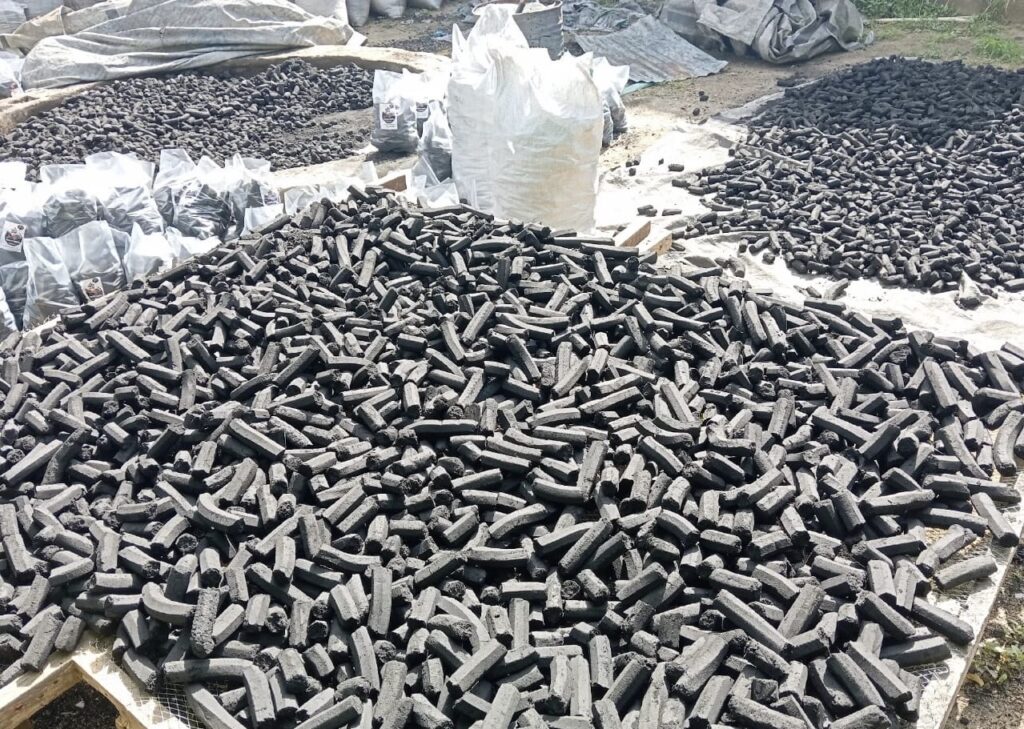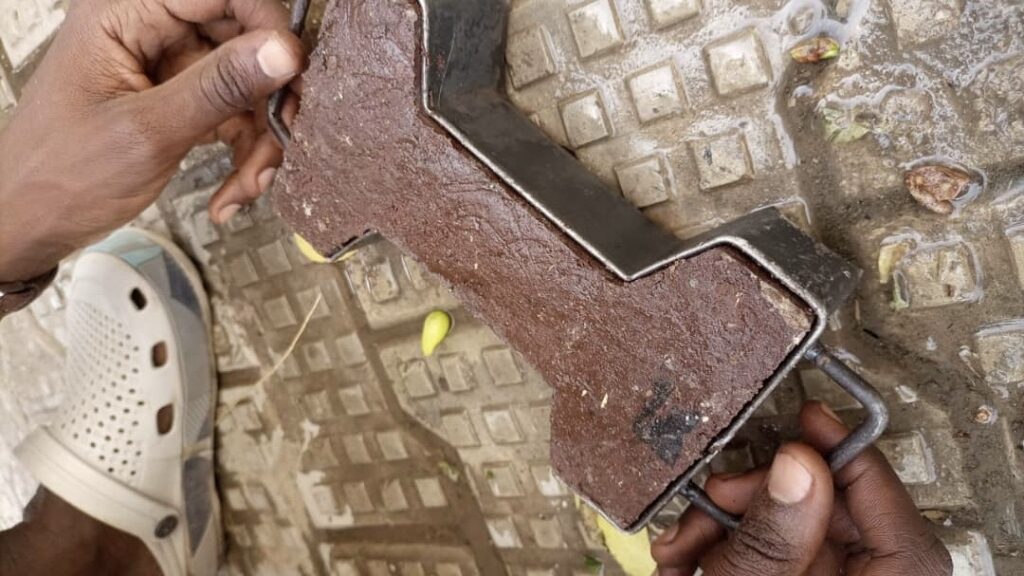Amid the pressing challenges of waste management and environmental degradation, young innovators in Borno State, northeastern Nigeria, are emerging with bold solutions to transform their communities. Ibrahim Ali, 34, the founder of Kariye Green Bio Energy, is one of the leaders of this new movement. Driven by a desire to address the environmental and health issues caused by traditional charcoal production, Ibrahim is pioneering the manufacture of eco-friendly cooking charcoal. His journey began with the realisation that most of the trees felled in Borno are either used as firewood or burned to make charcoal, exacerbating deforestation and environmental harm.
Determined to find a sustainable alternative, he developed a new method of producing efficient and eco-friendly charcoal using carbonised rice husks, cassava waste, and clay soil.
“This initiative not only helps reduce tree felling but also provides job opportunities for fellow youths,” he told HumAngle.
Although training others on the production process has been challenging, Ibrahim’s company now has over 30 young employees. Another significant hurdle is sourcing raw materials, particularly during the rainy season when travelling to Zabarmari, a community about 25 kilometres from Maiduguri.
Ibrahim has invented a more effective charcoal product, as it lasts longer and is more powerful when compared to traditional wood-based charcoal, according to testimonies from users. He told HumAngle he took constructive criticism to heart by improving the product’s ignition speed. He now plans to expand the company and train at least 100 people, further reducing deforestation in Borno.

Zainab Adam, a Borno resident, said she was impressed when she first encountered the cooking charcoal during an official visit to the Borno State Environmental Protection Agency (BOSEPA). “Compared to normal charcoal, it doesn’t stain pots or dirty the cooking space. It also lights up easily and burns slowly,” she remarked. She, however, expressed concerns over the smoke emitted during production, which she fears could be harmful.
While Ibrahim focuses on eco-friendly cooking charcoal, another young innovator, Halima Yusuf Bawa, 26, turns waste into interlock bricks. Inspired by a climate accelerator program she attended in 2023, Halima founded the Lumina Green Initiative, which recycles plastic waste into durable, cost-effective interlock bricks.
Her idea was recognised as one of the best during the program, earning her the title of climate champion. Determined to bring her vision to life, Halima conducted extensive testing at the University of Maiduguri laboratories.
Despite initial reluctance from her peers, she persevered and worked with three committed friends. Now, her interlock bricks are not only affordable but also water-resistant and strong, according to users.

“Plastic waste leads to blocked waterways and landfills, causing environmental problems. Our initiative helps reduce this waste in communities like Bakasi in Maiduguri,” Halima explained.
The Lumina Green Initiative now seeks collaboration with the state’s Ministry of Environment to collect plastic waste gathered during monthly sanitation exercises. Halima also plans to apply for grants to establish a facility for large-scale interlock brick production and collaborate with non-governmental organisations to boost the state’s economy. She encourages other youths to stay determined despite obstacles.
The Process
The transformation from agricultural waste to eco-friendly charcoal starts with collecting rice and cassava husks from the farm. These husks are then spread out under the sun to dry, allowing them to lose moisture. This step is vital, as it ensures that when the husks are eventually burned, they emit less smoke and produce a cleaner burn, according to Ibrahim.
Once the husks are dried, they are ground into smaller particles, making them easier to process. This can be done using a grinding machine or even by hand, depending on available resources. “But at Kariye Green Bio Energy, a machine is used,” Ibrahim added.
The next phase is carbonisation, where the husks are slowly burned in a specially prepared earth pit. This process, known as pyrolysis, is essential for producing high-quality biochar.
“The carbonisation process is delicate; it requires patience and care to ensure the husks turn into good charcoal,” Ibrahim explained.
After carbonisation, the char is allowed to cool, but the process doesn’t end there. To create durable briquettes, a binder is required, and clay soil is often used for this purpose. The char is mixed with clay, which not only binds the particles together but also adds structure to the final product.
Water is then added to the mixture, creating a paste that can be easily moulded into briquettes. These are then shaped, either by hand or using moulds, into uniform sizes.
The final step is drying. The briquettes are laid out under the sun once more to remove any remaining moisture. Once fully dried, these eco-friendly charcoal briquettes are ready for use, Ibrahim noted.
Halima of Lumina Green also detailed the process of transforming waste into interlock bricks. “The process begins with the collection of waste materials, including plastic bottles, broken tiles, and even agricultural residue. My team and I are actively involved in this phase,” she explained.
“The real work begins after the sand is heated. We mix all types of plastics, both low and high-density, thoroughly with the sand. The mixture is then fed into a machine that shreds the plastics into smaller, manageable pieces. These fragments are further pulverised into a fine powder,” Halima continued.
During this phase, other additives like fly ash, a byproduct of industrial processes, are incorporated into the powder before it’s pressed into moulds. This step demands precision and care to ensure each interlock meets the necessary standards of quality and durability.
Once the interlocks are moulded, they are left to dry naturally under the warm Maiduguri sun, a crucial part of the process that allows the bricks to harden and gain strength.
“After several days, the bricks are ready for inspection,” Halima added, describing how the final products, with their smooth surfaces and sharp edges, are a far cry from the waste they once were. Once removed from the moulds, the interlock bricks are ready for use.
“This process is simpler than that of other interlocks,” Halima concluded.
Usman Aliyu, an environmental scientist, said he has closely observed the rise of youth-led initiatives in Borno State. He explained that in environmental management, there’s a concept called “transforming waste into wealth”, adding that the initiatives these youths are undertaking are a vital part of environmental management and help address waste pollution in the state.
“Another key aspect of environmental management is the ‘Three Rs’ reduce, reuse, and recycle. These youth-driven initiatives align well with this approach,” he noted.
Aliyu stressed the importance of these efforts, especially as Borno State experiences the growing impacts of climate change. “The interlock bricks and charcoal produced by these youths are not only environmentally friendly but are also stronger and more durable than conventional ones,” he said, adding that managing waste also helps prevent flooding, as improperly disposed waste can block waterways, leading to serious consequences. He noted that beyond the environmental benefits, producing and selling these interlock bricks and charcoal provides a livelihood for young people.
“My advice to these youths is to follow the established safety protocols during production; this includes wearing personal protective equipment like face masks, gloves, boots, glasses, and helmets when handling waste, whether liquid or solid,” he told HumAngle, explaining that using protective gear is crucial for their health, safeguarding them from potential hazards such as smoke and germs. “Burning waste releases carbon dioxide, which is harmful to the respiratory system when inhaled,” he warned.
Abdullahi Abubakar, the Sanitation Desk Officer and spokesperson of the Borno State Environmental Protection Agency (BOSEPA) stated that support for these youth-led initiatives is in progress, noting that there are plans to collaborate with non-governmental organisations to provide the necessary backing for such efforts.
He added that organisations like the Borno State Sanitation Consultation Forum are also keen on supporting these initiatives. “I advise these young people to reach out to the chairman of the forum and even the General Manager of BOSEPA to showcase their talents and seek the needed collaboration,” he suggested.
Abubakar commended the youth for their innovative approach, noting that their efforts have not only promoted a safer environment but have also helped reduce the unemployment rate in the state. He assured that he would inform the relevant ministries about these initiatives, as the government is eager to support such efforts.
Usman Aliyu, who also serves as the Director General of the Borno State Agency for the Great Green Wall, shared his perspective on the projects, saying he believes the government is ready to support these kinds of initiatives, especially if the young people are organising themselves into associations or clubs that can be easily identified and engaged by the government.
“My agency is also open to supporting these initiatives. I plan to teach some young people about these practices soon and encourage them to visit my office. If their work is well documented, I am committed to forwarding it to the government for further support,” he added.
This report was produced under the 2024 HumAngle Accountability Fellowship.
Support Our Journalism
There are millions of ordinary people affected by conflict in Africa whose stories are missing in the mainstream media. HumAngle is determined to tell those challenging and under-reported stories, hoping that the people impacted by these conflicts will find the safety and security they deserve.
To ensure that we continue to provide public service coverage, we have a small favour to ask you. We want you to be part of our journalistic endeavour by contributing a token to us.
Your donation will further promote a robust, free, and independent media.
